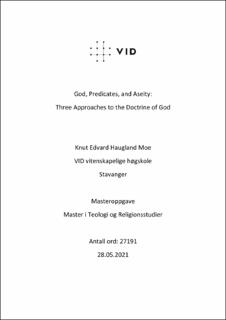| dc.contributor.author | Moe, Knut Edvard Haugland | |
| dc.date.accessioned | 2023-04-11T09:42:03Z | |
| dc.date.available | 2023-04-11T09:42:03Z | |
| dc.date.issued | 2021-05 | |
| dc.identifier.uri | https://hdl.handle.net/11250/3062325 | |
| dc.description | Master's thesis in theology. VID Specialized University, Stavanger, May 2021 | |
| dc.description.abstract | Læren om guddommelig aseitet handler om at Gud ikke er avhengig av noe utenfor seg selv. I denne oppgaven presenterer jeg tre tilnærminger til gudsforståelse: apofatisme, thomisme og swinburniansk teisme. Apofatisk teologi tar utgangspunkt i at Gud er utenfor menneskets fatteevne. Thomismen forstår Gud som ren væren, uten skille mellom eksistens og essens. Den swinburnianske tilnærmingen har kritisert Thomismen for å redusere Gud til en egenskap og at dette derfor uforenlig med guddommelig frihet og en ekte relasjon til skaperverket. Dette fører til en forståelse der Gud er et åndelig vesen som eksisterer av nødvendighet, men som besitter egenskaper som ikke er identisk med dets eksistens, som dermed problematiserer aseitet. Denne oppgaven argumenterer for at en apofatisk gudsforståelse kan unngå problemene som pekes på ved Thomismen og samtidig ivareta aseitet. | en_US |
| dc.description.abstract | The doctrine of divine aseity is about God not being dependent on anything non-God. This thesis presents three approaches to the doctrine of God: apophaticism, Thomism and Swinburnian theism. Apophatic theology conceives of God as ineffable and thus beyond human comprehension. Thomism conceives of God as existence itself, in whom existence is identical with essence. The Swinburnian approach to theism has criticized the Thomistic doctrine of God for rendering God a property which is incompatible with divine freedom and thus a real relationship to creation. This leads to the conception of God as a necessarily existing spirit, consisting of properties that are distinguishable from the divine essence, causing problems for divine aseity. This thesis argues that by embracing an apophatic doctrine of God as ineffable, one can avoid the criticism of the Thomistic conception of God while maintaining divine aseity. | en_US |
| dc.language.iso | nob | en_US |
| dc.subject | Gud | en_US |
| dc.subject | aseitet | en_US |
| dc.subject | God | en_US |
| dc.subject | aseity | en_US |
| dc.title | God, Predicates, and Aseity : Three Approaches to the Doctrine of God | en_US |
| dc.type | Master thesis | en_US |
| dc.description.version | submittedVersion | en_US |
| dc.rights.holder | Forfatteren har opphavsrettighetene til oppgaven. Nedlasting for privat bruk er tillatt. | en_US |
| dc.subject.nsi | VDP::Humaniora: 000::Teologi og religionsvitenskap: 150 | en_US |
| dc.source.pagenumber | 76 | en_US |
